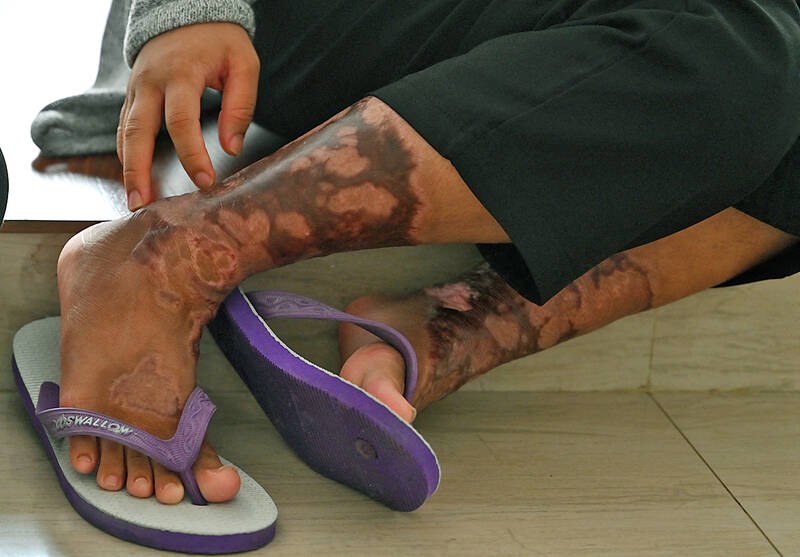Beaten, forced to eat animal feces and chained to a dog cage — the abuse of an Indonesian maid highlights the government’s failure to protect domestic workers at home even as it moves to help those abroad, critics said.
Siti Khotimah last year left her Central Java hometown for the capital, Jakarta, when she found a maid job on Facebook to help her parents with debt.
After months of torture by her employer, the 24-year-old now walks with a limp and has visible burn scars along her legs.

Photo: AFP
“My head hurts every time I think about what happened to me,” she said, sobbing.
Khotimah’s case is not unique in Indonesia, the largest democracy without a bill to protect domestic workers, leaving more than 4 million people — mostly women — vulnerable to abuse.
Her wealthy 70-year-old employer in south Jakarta was jailed for four years for physical abuse last month, while the woman’s husband, daughter and six other maids were all handed three-and-a-half years.
Khotimah said she was also raped during her employment, but was unable to initially talk about it. She has since informed police who advised her to file a separate lawsuit for sexual abuse.
“I am very disappointed, the sentence is so light compared to what happened to me. They should have felt what I feel,” she said.
A domestic worker bill has remained in limbo for nearly two decades and activists accuse the government of dragging its feet.
Under the current legal framework, maids are not classified as workers, forcing them to operate in an informal and unregulated economy.
Even if the law does go ahead, it would mainly help those recruited by agents to work overseas, advocates said.
“The law is very discriminatory,” said lawmaker Willy Aditya, who heads the bill’s working committee.
Women’s rights campaigners say the government must do more to support domestic helpers within Indonesia.
“Khotimah’s case is not the first. The government’s response has always been slow,” said Tiasri Wiandani of the National Commission for Eradication of Violence against Women.
“Demanding protection from other countries while we have not fulfilled the responsibilities ourselves is like a slap in our face,” she said.
Despite the risks and horrifying stories of abuse, women from rural areas like Khotimah feel compelled by poverty to keep moving to big cities for work.
“We owed money in our village. There was no other choice,” she said.
She said the abuse began a few weeks after her arrival in April last year when another worker accused her of petty theft. Khotimah was accused of more theft, which she denied, and the abuse continued until December. She recalled her employers forcing her to drink their dog’s urine and eat its waste.
“I got hit by multiple people, my boss poured boiling water on me. They later chained me,” she said.
During eight months of work, Khotimah said she did not get a salary except for a 1.5 million rupiah (US$99) payment before she was taken home to Central Java.
“I was afraid the driver would just leave me on the roadside, because I no longer looked like a human,” she said.
Khotimah’s mother found her at 3am, whimpering on the floor with her hair chopped short. Blood and pus were flowing from the wounds on her legs. Both her arms were peppered with cigarette burns.
“She was crying soundlessly. I woke my husband up and told him: ‘Our child is home, but she is dying,’” said Khotimah’s mother, Eni Sopiyah.
The family called the police.
The suspects were arrested while Khotimah was transferred to a Jakarta hospital where she spent four months recuperating. While she is still physically recovering, she pledges to carry on fighting for justice for herself and other maids.
With the help of rights group Jala PRT, she is filing rape charges against her employer under sexual abuse and human trafficking laws.
“I hope the domestic workers’ protection law will be passed immediately so there will be no other Khotimah,” she said.
“Let me be the last to suffer,” she said.

‘NEO-NAZIS’: A minister described the rally as ‘spreading hate’ and ‘dividing our communities,’ adding that it had been organized and promoted by far-right groups Thousands of Australians joined anti-immigration rallies across the country yesterday that the center-left government condemned, saying they sought to spread hate and were linked to neo-Nazis. “March for Australia” rallies against immigration were held in Sydney, and other state capitals and regional centers, according to the group’s Web site. “Mass migration has torn at the bonds that held our communities together,” the Web site said. The group posted on X on Saturday that the rallies aimed to do “what the mainstream politicians never have the courage to do: demand an end to mass immigration.” The group also said it was concerned about culture,

CRACKDOWN: The Indonesian president vowed to clamp down on ‘treason and terrorism,’ while acceding to some protest demands to revoke lawmaker benefits Protests in Indonesia over rising living costs and inequality intensified overnight, prompting Indonesian President Prabowo Subianto to cancel a planned trip to China, while demonstrators reportedly targeted the homes of the finance minister and several lawmakers. Rioters entered Indonesian Minister of Finance Sri Mulyani Indrawati’s residence near Jakarta early yesterday, but were repelled by armed forces personnel, Kompas reported. Items were taken from the homes of lawmaker Ahmad Sahroni and two others, according to Detik.com. The reports of looting could not be independently verified, and the finance ministry has not responded to requests for comment. The protests were sparked by outrage over

VENEZUELAN ACTION: Marco Rubio said that previous US interdiction efforts have not stemmed the flow of illicit drugs into the US and that ‘blowing them up’ would US President Donald Trump on Wednesday justified a lethal military strike that his administration said was carried out a day earlier against a Venezuelan gang as a necessary effort by the US to send a message to Latin American cartels. Asked why the military did not instead interdict the vessel and capture those on board, Trump said that the operation would cause drug smugglers to think twice about trying to move drugs into the US. “There was massive amounts of drugs coming into our country to kill a lot of people and everybody fully understands that,” Trump said while hosting Polish President

A French couple kept Louise, a playful black panther, in an apartment in northern France, triggering panic when she was spotted roaming nearby rooftops. The pair were were handed suspended jail sentences on Thursday for illegally keeping a wild animal, despite protesting that they saw Louise as their baby. The ruling follows a September 2019 incident when the months-old feline was seen roaming a rooftop in Armentieres after slipping out of the couple’s window. Authorities captured the panther by sedating her with anesthetic darts after she entered a home. No injuries were reported during the animal’s time on the loose. The court in the